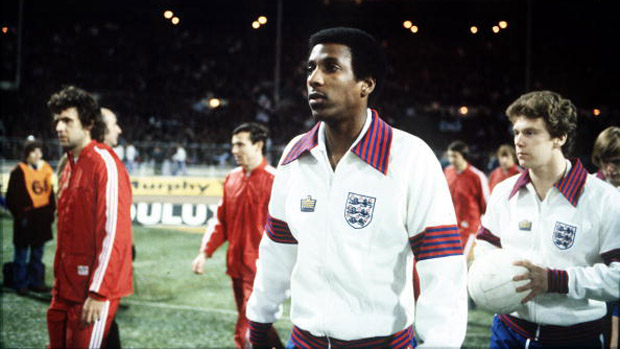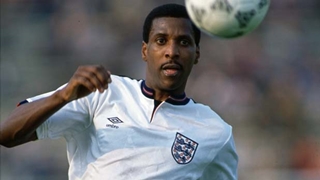
Viv Anderson took centre stage on Thursday night to reminisce, debate and discuss some of the beautiful game’s burning issues.
It was a special Black History Month event organised by The FA and the People’s History Museum in Manchester.
Such is the significance of Anderson’s place in the cultural and sporting history of the country, as the first black player to win a senior cap for England, the museum has named him alongside British icons including Winston Churchill, Charles Dickens and Billy Bragg on their ‘100 Radical Heroes’ list.

Viv Anderson holds the shirt he wore on his England debut, which is on display at the People's History Museum
The shirt Anderson wore during his England debut on 29 November 1978 stands on display at the museum, where the former Nottingham Forest, Arsenal and Manchester United defender took part in the 'Audience With' event, hosted by Rodney Hinds, sports editor of The Voice newspaper.
Fittingly, on the eve of the one-year anniversary of the Arthur Wharton statue being unveiled at St. George's Park, campaigners Howard Holmes from Football Unites, Racism Divides and Shaun Campbell from the Arthur Wharton Foundation both joined the event.
Up for discussion on the night was everything from amusing anecdotes of yesteryear, to poignant current issues such as BAME inclusion in football and the disproportionate numbers of black managers in the game today.
He told tales of Brian Clough and Diego Maradona – to whom Anderson says the legendary manager once confronted with “so you’re that little fat lad”, before a pre-season friendly, only for Maradona go on and “destroy us”.
“I remember meeting Brian Clough like it was yesterday,” he smiled. “He was an enigma. You never knew from one minute to the next what he would be like.”
He remembered winning the European Cup with Nottingham Forest – which he said would be akin to Bournemouth becoming Premier League champions this year and Champions League winners for the following two after that.
“The self belief came from him [Clough]. He and Peter [Taylor] together – who you can’t forget because he played a big part in all our success. He was good cop to Clough’s bad cop,” he joked.
Anderson also spoke about signing his first schoolboy forms with Nottingham Forest, facing early rejection from Manchester United and getting a job as a silk screen printer, to eventually becoming Sir Alex Ferguson’s first signing at Old Trafford and going on to play for England 30 times.
The crowd that packed inside the museum’s ‘Engine Room’ laughed along with the amusing anecdotes from a bygone era, but they were also in attendance to hear Anderson and Hinds discuss more poignant matters.
Such as the burden of responsibility he felt after becoming England’s first black senior international.
“I’d been in the Under-21s and the England B," he said. "There was always talk about Laurie [Cunningham], god rest his soul, getting called up.
"There was always debates in the papers, so there was a lot of speculation about who would be called up for that specific game.
“Cloughie called me into the office and told me he had the letter from The FA. 'You’ve been chosen to play in the Czechoslovakia game'.
“Obviously I was very proud. I’m a very proud Englishman. I was born and bred here and I had always wanted to play for my country. Like any other footballer, from whatever country they’re from.
“I didn’t understand the significance of it all at the time. I was just a skinny lad from Nottingham. My job was to play football.”
Today, 37 years later, a black player putting on an England shirt is, of course, no longer a newsworthy event.
However, the discussion moved on to something that remains a pertinent issue – the lack of black managers working in the professional game.
Of the 92 Premier League and Football League clubs, only five black managers are at the helm.
Something, Anderson – who had a brief spell as manager of Barnsley in 1993-94 – says disappoints him.
“I was a manager 20-odd years ago now. Keith Alexander was the other. We were the only two. Everybody said in the media ‘this will be the start’.
“Twenty years later we’re still in the same position. I think the perception is ‘they’re very good players, not very good managers’. The perception is wrong."
“Everybody talks about the Rooney rule. I don’t know. Whatever it takes, though, there’s got to be a rule that provides opportunities."
He continued: “Whether you’re black, white, purple or blue - if you’ve got the qualifications you should be given the opportunity.
“We have to change. We don’t want to go another 20 years and be in the same position. There’s so many black and Asian kids playing the game now - they want to strive to be something different after football. They want to see role models. At this moment in time four is disproportionate.
“Lots of good work is being done, such as The FA’s bursary programmes, but we need to continue to inspire young people.”
For more information about The People’s History Museum’s ‘Radical Heroes’ initiative click here.
To find out more about Black History Month, please click here.












